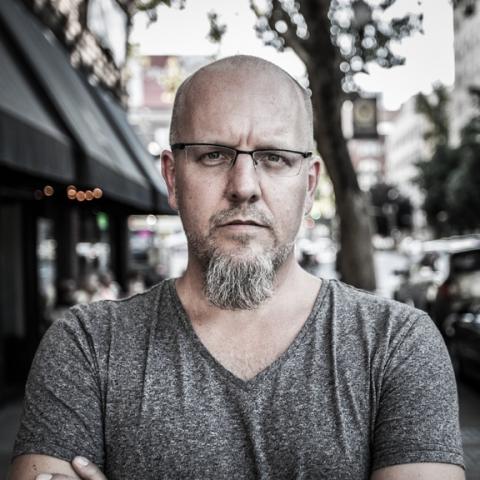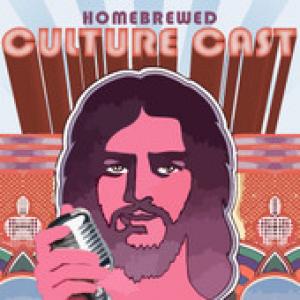
Christian Piatt is an author, blogger at Patheos and founder/cohost of the Homebrewed CultureCast podcast, where he focuses on the intersection of faith and popular culture. His latest book, “Leaving A-holiness Behind,” is available now, and his next book, “Surviving the Bible: A Devotional for the Church Year 2018,” will be available November 1, 2017.
Posts By This Author
Pope Francis on Gays Reveals a House Divided

Painting of Pope Francis by faithmouse / Flickr.com, http://www.flickr.com/photos/dan_lacey_pancakes/
Pope Francis quickly is establishing himself as the “peoples’ Pope.” He has actively advocated for the poor, downplayed his elevated status, and speaks in colloquial terms that make him seem that much more human. He has left open the possibility that non-Catholics, non-Christians, and even atheists may fall within the vast embrace of a radically loving and merciful God. And now, he’s even made what many consider at least a benign – if not affirming – statement about homosexuality.
Historically, popes have toed an ideological line, asserting that homosexuality is inherently evil, and that all gay people are fundamentally disordered. In an expression of sincere humility, political savvy, or perhaps some combination of both, Francis took a more compassionate position, adding at the end of his comments, "who am I to judge?"
Welcome to the 20th century, Catholic Church.
Choosing Royal Babies Over Abu Ghraib
By now most of the world knows the royal family in England is celebrating the birth of little baby George Alexander Louis. The commentators panted as they caught the first glimpses of the magic baby, about everything from the infant's apparent ability to withstand a media onslaught to the ever-so-newsworthy fact that his father drove the family home with his own two hands.
Meanwhile in Iraq, several hundred prisoners of the infamous Abu Ghraib facility escaped, many of whom were known or suspected members of Al Qaeda. Considering the attention given to the few dozen detainees still held in Guantánamo Bay, it seems reasonable to think that such a breakout would arrest the headlines around the globe.
But instead, we stayed focused for the most part on baby George. I remarked about this to my friend, sharing my concern about the apparent distortion of priorities. He suggested that it simply is a sign of cultural fatigue, or even resignation. Sometimes, after all, these stories that have international importance seem so big, so abstract, and so far away that it is hard to wrap our minds around them. It’s easier instead to set our attention on something more hopeful — albeit remarkably more superficial — that won’t keep us awake at night.
Is Church Still a Curator of Culture?
My wife and I are attending our denomination's national assembly in Orlando this week. Last night, we went to a retirement party for one of her mentors. As a group of ministers tends to do, they concluded by gathering around, laying their hands on, and offering him a prayer of blessing. Then the group spontaneously broke out into a round of song that went on for a few minutes. It was both beautiful and touching.
The wait staff, however, wasn’t quite sure how to take it.
"Wow," one bartender said," that's amazing. You guys can all really sing."
Amy just smiled.
“That's church," she said.
No Girls Allowed
What kind of tentmakers are we? Are we more like Martha, so preoccupied with busywork that we neglect our neighbors, the guests of honor? Do we stand by and rejoice in the misfortune of others suffer the consequences of their own doing, rather than inviting them in and making room for them at the table, under the protection of our shade? When we see a stranger come by, do we drop everything, bring out the best of what we have and sit at their feet in humble service?
Re-Imagining Patriotism
I was five years old on Independence Day in 1976. The United States' bicentennial fever had overtaken the entire population. Everything was dressed in red, white, and blue. I remember decorating my tricycle in streamers and balloons for the neighborhood parade. It rained through the entire event, and although I crossed the finish line covered in red and blue dye, my award for "most colorful float" made it all worth it.
Also attended Willie Nelson's Fourth of July birthday party/concert that same year. We camped out under the stars and enjoyed music for days in a Woodstock-like environment. I remember seeing my first naked adult woman there. She and her family – or some group of friends – were taking a break to bathe in the nearby river. Hey, it was the 70s, remember?
But even there in that hotbed of post-hippie activity, everyone displayed affection for our country. Even those who likely had stood in protest against the Vietnam War only years before rose and placed their hands over their hearts when the national anthem was sung and the flag was unfurled every morning.
Somewhere along the way, the idea seeped into our national consciousness that patriotism and political criticism could no longer coexist. Those who questioned or challenged the agendas or motives of those in power were pegged as patently unpatriotic; in turn, those dissident voices increasingly rejected the commonly embraced symbols of patriotism as mere tokens of jingoist American exceptionalism.
Christianity for Non-Christians
There are lots of biases and assumptions about Christians out there, many of which are founded in real-life experience. And yes, we Christians have done our share of damage when it comes to tarnishing our so-called “brand.” But there also seems to be this tendency to understand Christianity and its adherents as one generally monolithic group that can be described in simple (often negative) terms that they would never be acceptable to apply to any other group.
Part of this is because of the historic dominance of the Christian culture in the modern Western world. It’s the same reason that stereotypes of men on network sitcoms are pervasively unflattering, while the same stereotypes would cause a firestorm of negative publicity if applied to the female counterparts. Some of this is entirely warranted and necessary in tearing down false or damaging constructs of power. But sometimes, if we’re being honest, they’re just wrong. And stupid.
Exodus International’s Alan Chambers: Bending History’s Arc
For more than a generation, the gay conversion organization known as Exodus International has been one of the most prominent Christian symbols of LGBT intolerance. They have practiced what is commonly called “reparative therapy” to supposedly remove the urges of same-sex attraction from those who seek to become straight. I have personally written at great length about the damage done by such religiously fueled zealotry, but never in my lifetime did I anticipate that the leader of this infamous anti-gay organization would concede as much to the public in the form of a confession.
What’s more, at their 38th annual convention, Exodus International’s director, Alan Chambers, announced plans to close the organization and cease its mission for good. You can read Mr. Chambers’ full of apology HERE, as well as the formal closure announcement HERE.
I’m not prone to emotional hyperbole, but I read these announcements and confessions with a nearly overwhelming admixture of shock, disbelief, compassion, and hope. I also try not to fill my blog posts with too much content from other sources, but this is one of those occasions when the original source material should be seen without adaptation. Following are several excerpts for Mr. Chambers’ open apology to the public, along with my thoughts:
I Love Technology; I Hate Technology
It’s exhilarating to realize that I’m getting more done in less time. I got up and took a walk around the church while back, feeling pretty satisfied that I had fulfilled all of my professional duties for the day. And here it was, more than an hour before I even have to go pick up the kids!
But then I had a moment beset with pangs of anxiety. Yes, at the moment I can answer emails faster with this little gadget than most people can muster a response. It puts me slightly ahead of the curve. But then I realized this advantage is only a temporary luxury. The efficiency that a new technology affords only works as long as the majority of people you come into contact with aren't yet using the same technology. Once they are, the entire conversation accelerates, and the expectations of everyone increase to at least reach the maximum limit of the new capability everyone has just recently acquired.
Stop Telling Me What Is Anti-Christian
Anyone who listens to our Homebrewed Christianity CultureCast knows that we love Game of Thrones. The writing is complex and dramatic, and the characters are fascinating. What’s more, after the recent “Red Wedding” episode, we’re all too aware that no character, no matter how important or beloved, is safe.
The series, set in a fictitious medieval Europe, is also dark, exploitive, highly sexualized at times, and one has to stretch to glean any moral redemption from the episodes. As such, there’s a debate swirling online about whether Christians can or should watch such a show. Where’s the Gospel? How can we justify all the sex and bloodshed? Do we watch with the (possibly deluded) hope that things will incline toward virtue, even though the series creator has suggested no such intention?
Or should we just turn it off?
Now, there’s a constituency of evangelicals and Tea Partiers who claim that, since the coffee super-chain Starbucks supports same-sex partner benefits, drinking their coffee (and therefore inadvertently supporting gay rights, I suppose) is anti-Christian. So sorry, followers of Jesus, but that favorite frappuccino you look forward to every afternoon is off the menu. If you don’t want to make Jesus cry, at least.
The Dangers of Christian 'Marriage Worship'
I’ve written before about the seemingly contrasting messages we offer to young people in church about sex and sexuality:
Sex is dirty; save it for someone you marry someday.
Umm, what? Granted, we walk a narrow rhetorical tightrope when discussing sex with our kids. If we tell them it’s actually pretty awesome, and then tell them they can’t do it, that’s a setup for failure. On the other hand, if we focus on the negatives, we risk scarring and shaming them into a life of emotional conflict and struggle when it comes to sexual intimacy.
What we end up with, often times, is a vacuous silence when it comes to the real, difficult issues of sexual identity, impulse, and expression. Add to that the Christian emphasis on marriage, and the result in many cases is scads of unhealthy, sexually awkward young people, married far too early with no idea why.
Five Questions with Author of 'The Invisible Girls'
Sarah Thebarge is the author of The Invisible Girls, a new memoir from Jericho Books. I was fortunate to get a few minutes to ask her a few questions about her touching, funny, compelling new piece of work.
Q: Your book is about Somali Refugees and also about your survival of breast cancer. How do you write one book about both things?
A: When I met the Somali mom and her girls on the MAX the first time, we had a lot of differences – different religions, ethnicities, skin color, and language. But as I developed a relationship with them, I realized that we had a lot in common at the core. Because I’d been a little girl growing up in a fundamentalist culture, where men buried you under yards of fabric and lists of rules and taught you that women were supposed to be silent. And I knew what it was like to be a refugee of sorts, because after I nearly died of cancer in my 20s, I sold everything I had and got on a plane with a suitcase of clothes and flew from the east coast to Portland, Ore., and started over. And so even though the narrative lines of the Somali refugee family and my cancer experiences seem disparate, they actually weave together well, because all this time, I’d been an Invisible Girl, too.
If Cheerleaders Don’t Convert You, Chuck Norris Will
You know, I always hedge when people ask me where I’m from, because the second I tell them I was born and raised in Texas, all kinds of stereotypes pop up in the conversation.
Yes, I can read.
No, I’m not a Republican.
Yes, I’m a Christian. No, not that kind.
No, I don’t ride horses, own a cow, oil derek or know JR Ewing personally.
And no, I do not think Texas should become its own republic.
But then, stories like this one come along that only serve to reinforce the negative biases against Texans that I try so very hard to debunk. Come on guys, work with me here!
Tales of a Male 'Preacher's Wife'
The stats say that women in the workplace – from seminaries to the boardroom – have become the norm, but being a stay-at-home dad is still considered a countercultural act (even in Portland).
MY WIFE IS a pastor. Specifically, she’s the senior pastor of a prominent church in downtown Portland, Ore. I’m on staff too, but only part-time, and she enjoys telling people she’s my boss. Technically, I answer to the church board, but people get a laugh about the reversal of “typical roles.”
I get my share of “preacher’s wife” jokes, to which I have a handful of rote responses. No, I don’t knit or make casseroles. No, I don’t play in the bell choir. Generally, the jokes are pretty gentle, but they all point to the reality that few of us will actually talk about: We see the traditional roles of women as less important than those of their male counterparts. And so, to see a man who works from home most of the time and takes the kids to school while his wife has the “high power” job brings everything from the man’s masculinity to his ambition into question.
But regardless of the teasing I get, Amy has it a lot worse. One time, when she was guest preaching at a church in Colorado, a tall man who appeared to be in his 60s came up to her after worship. “That was pretty good,” he said, smiling but not extending his hand, “for a girl.”
Amy and I planted a church in southern Colorado 10 years ago, and we actually kind of enjoyed watching people’s expectations get turned on end when they met us. A newcomer would walk in the doors of the church and almost always walk up to me and start asking questions about our congregation.
“Oh, you’re looking for the person in charge,” I’d say. “She’s over there.” Then would come the dropped jaws and the wordless stammers as they reconfigure everything they assumed walking through the door. Amy’s even had people stand up and walk out in the middle of worship when they realize she’s about to preach.
Jim Wallis Returns to the CultureCast with Christian Piatt
Not to get all braggy here, but this episode is pretty great.
First, we have our first return guest, and it’s one of our best: Jim Wallis. Christian moderated a discussion with Jim at Powell’s Books last week to talk about his new book about nurturing the common good, called On God’s Side.
I swear, Jim Wallis is incapable of saying uninteresting things. What an honor to have him back (even if Jordan didn’t get to be there).
We spend the second half of the show talking about bombings and explosions and ricin. I promise, it’s not as depressing as it sounds. Namely, we wanted to talk about racial profiling when it comes to terror suspects, the shifting tectonics of how we get news in America, how to talk about tragedy with children, and how much faith is to blame in religious extremism.
Seriously, even with horribly serious subject matter, this was a really fun show to do and talk about, and we use our senses of humor to cope. We hope you enjoy.
Radical Theology: The New 'White' Religion?
I’ve experienced some strange extremes lately. First, I attended – and spoke at – the Subverting the Norm conference in Springfield, Mo., where we took some time to consider how, if at all, so-called “radical theology” could exist within today’s religious systems. Then I got home and found my latest TIME Magazine, with a cover story titled “The Latino Reformation,” which reveals what most within Protestantism have known for some time: formerly Catholic Latino Christians are dramatically reshaping the face of the American Christian landscape.
Interestingly, there is little-to-no overlap between these two groups – a point which was made clear to me by the fact that there were very few people of color in attendance at Subverting the Norm. One comment, from an African-American woman who was there, was that the very focus of the conference (on academic, esoteric questions of theology and philosophy) assumed the kind of privilege still dominated by middle-class white males. Put another way: while we’re busy navel-gazing and discussing the meaning of Nietzsche’s “death of God,” non-Anglo religious leaders were busy dealing with real-world problems right in front of them.
Talking to My Son About Boston
I woke up this morning, like everyone else, to the news of a shootout with one suspect in the Boston Marathon bombing and the ongoing manhunt for a second brother. Like many others, I’ve heard lots of misinformation over the past few days about whether officials did or didn’t have a suspect, whether they did or didn’t have them in custody, and so on.
“I heard someone dropped a bomb on Boston,” said Mattias, my 9-year-old son, over breakfast while I scrolled through the breaking news reports.
“Not exactly,” I said. “It was two guys. Two brothers who came from [another country] to go to college at MIT.” They put homemade bombs in and around trashcans by the finish line of the marathon.”
“Why?” he asked.
“I really don’t know.”
“Maybe they were angry about something, and they didn’t know how to talk about their feelings.”
“Maybe so,” I nodded.
“Did they hurt people?”
Be Ready to Be Changed
We have a group at our church that does a weekly sandwich ministry together. Though we already had a group that makes sandwiches each week for a local shelter, another team realized some folks don’t go to shelters, and that they might be missing out on a real opportunity to connect with different folks in our community if they didn’t go out to where the people are.
So now, every week, they walk the streets of downtown Portland and hand out upwards of 100 sandwiches. As they’ve met folks who live outside, they’ve identified other needs some have, such as socks, new underwear, rain gear, flashlights, and batteries. Each week, they come back with a list of needs, and each week our congregation helps fill those needs.
To me, this kind of ministry is exemplary of what missional church is about. We don’t simply wait behind the walls for people to come ask for something; we go out, meet people face-to-face and get to know them. Yes, we offer them a meal, but we also share stories, learn a bit of their history, and they come to know that there actually are flesh-and-blood people behind all those steeples and stone facades.
The Problem Isn’t God; It’s Certainty
Uncertainty about the existence of God is not the same thing as certainty about the non-existence of God.
I’ve enjoyed taking part in the “Subverting the Norm” conference this weekend with many of the forefront thinkers in what has been called “Radical Theology.” Although the word “radical” has sensationalist connotations for lots of people, it really just means a theology that isn’t firmly rooted. I know that in itself sounds scary to some folks, but the radical theology camp might suggest that fear stems from an addiction to certainty.
Jimmy Carter vs. the SBC/Driscoll/Victoria’s Secret: A Sea Change?
Jimmy Carter offered an open letter a few years ago explaining why he divorced himself from the Southern Baptist Convention after six decades as a deacon and Sunday School teacher. Basically, he contended that the SBC continued to legislate gender inequity from the top-down, cherry picking select verses to serve a desired patriarchal end, to which Carter responds:
It was, however, an unavoidable decision when the convention’s leaders, quoting a few carefully selected Bible verses and claiming that Eve was created second to Adam and was responsible for original sin, ordained that women must be “subservient” to their husbands and prohibited from serving as deacons, pastors or chaplains in the military service.
It’s easy, in the daily course of events, to forget how pervasive such judgments against the equality of women really are, especially as we have examples of powerful women in political office and business. But just as having a black President doesn’t solve racial inequities, neither do a handful of high-profile women indicate there isn’t an ongoing struggle for parity among millions of other women without such power.
Does Postmodern Theology Risk Becoming What It 'Hates?'
I’m no postmodern theology expert, so I’ll leave it to the pros to explicate more about what’s what in postmodern thought. But for me, the exciting work revolves around supplanting things like binary, propositional “truths” about God with more inductive, open-ended notions of the Divine that transcend religious doctrine or even our own mental constructs of God. This is both a necessary and a liberating process, I think, that indeed can lead the Church (big C Church, that is) toward something far more reconciling and healing for humanity than the modernist approach to faith we’ve employed for many decades now, if not some centuries.
It’s helpful to look back a little bit at where we’ve come from in our religious and theological evolution of thought and practice. At the risk of geeking out on something that puts everyone to sleep, I’ll try to make this quick and fairly painless. Interestingly, it can be argued that the more fundamentalist strain of Christianity can trace its origins back to the “liberal” thinking following the Enlightenment that suggested all things – faith, God, and religious thought included – could be explained by rational means. This hyper-rationalism sought to build up rhetorical constructs that made a case for God, so to speak, as well as buttressing the doctrines of the Church.

















